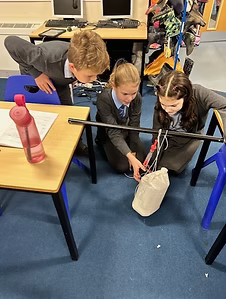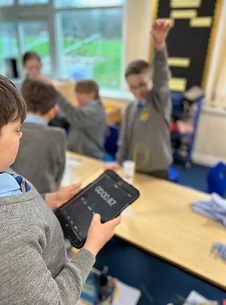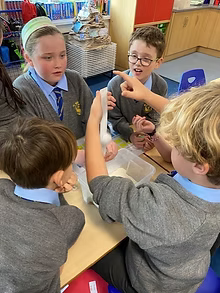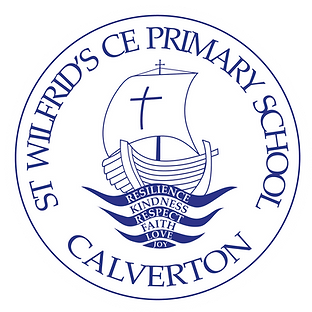Science
Intent
At our school, our science curriculum is designed with a strong intent to foster curiosity and encourage children to question the world around them. We believe in creating young minds that are naturally inquisitive and have a thirst for knowledge. Our curriculum aims to inspire and empower children to explore, discover, and make sense of the scientific wonders that surround them.
Through engaging and hands-on activities, we aim to ignite a sense of wonder and curiosity in our students. We encourage them to ask questions, investigate, and seek answers independently. By developing their questioning skills, we enable them to think critically, analyse  information, and develop a deeper understanding of scientific concepts.
information, and develop a deeper understanding of scientific concepts.
We promote a growth mindset within our science curriculum, emphasising that it's okay to make mistakes and learn from them. We encourage children to embrace challenges and view them as opportunities for growth. By nurturing their scientific curiosity, we aim to develop problem-solving skills, boost creativity, and enhance their ability to think outside the box.
Our Science curriculum also emphasises the importance of collaboration and communication. Through group projects, discussions, and presentations, we provide opportunities for children to share their findings, exchange ideas, and learn from one another. We believe that fostering a supportive and collaborative learning environment helps children develop strong interpersonal skills and become effective communicators.
Overall, our science curriculum intends to create lifelong learners who are not afraid to question, explore, and seek answers. By nurturing their curiosity, critical thinking skills, and  scientific mindset, we aim to equip our children with the tools necessary to navigate and contribute to an ever-evolving world.
scientific mindset, we aim to equip our children with the tools necessary to navigate and contribute to an ever-evolving world.
Implementation
Children will work scientifically focussing on the following areas: observing, classifying, finding patterns, research and fair testing.
Alongside encouraging children to enjoy and engage in Science, our main goals when teaching Science are:
To encourage children’s curiosity and allow them to ask questions and develop the skills they need to answer those questions about scientific phenomena through different types of scientific enquiries. This will be achieved by children working scientifically through the range of  science-based units of learning across school.
science-based units of learning across school.
To develop children’s substantive knowledge, vocabulary and disciplinary knowledge through a knowledge rich curriculum which is mapped out in the Science Progression document. This is also encouraged by lots of practical science activities in classes across school.
Impact
Impact The expected impact of our Science scheme of work is that children will: ● Develop a body of foundational knowledge for the Biology topics in the National curriculum: Plants; Animals, Including Humans; Living Things and Their Habitats; Evolution and Inheritance.
● Develop a body of foundational knowledge for the Chemistry topics in the National curriculum: Everyday Materials; Uses of Everyday Materials; Properties and Changes of Materials; States of Matter; Rocks.
● Develop a body of foundational knowledge for the Physics topics in the National curriculum: Seasonal Changes; Forces and Magnets; Sound; Light; Electricity; Earth and Space.
● Be able to evaluate and identify the methods that ‘real world’ scientists use to develop and answer scientific questions.
● Identify and use equipment effectively to accurately gather, measure and record data.
● Be able to display and convey data in a variety of ways, including graphs.
● Analyse data in order to identify, classify, group, and find patterns.
● Use evidence to formulate explanations and conclusions. ● Demonstrate scientific literacy through presenting concepts and communicating ideas using scientific vocabulary.
● Understand the importance of resilience and a growth mindset, particularly in reference to scientific enquiry.
● Meet the end of key stage expectations outlined in the National curriculum for Science.
Impact is constantly monitored through both formative and summative assessment opportunities. Verbal feedback and opportunities for rich discussion in every lesson also provide teachers with informative assessment for learning opportunities to adapt and monitor learning outcomes. Attainment and progress is measured across the school using end of unit tests, which also allow us to address any gaps in knowledge.
Our pupils should leave school equipped with a range of skills to enable them to succeed in their secondary education.
